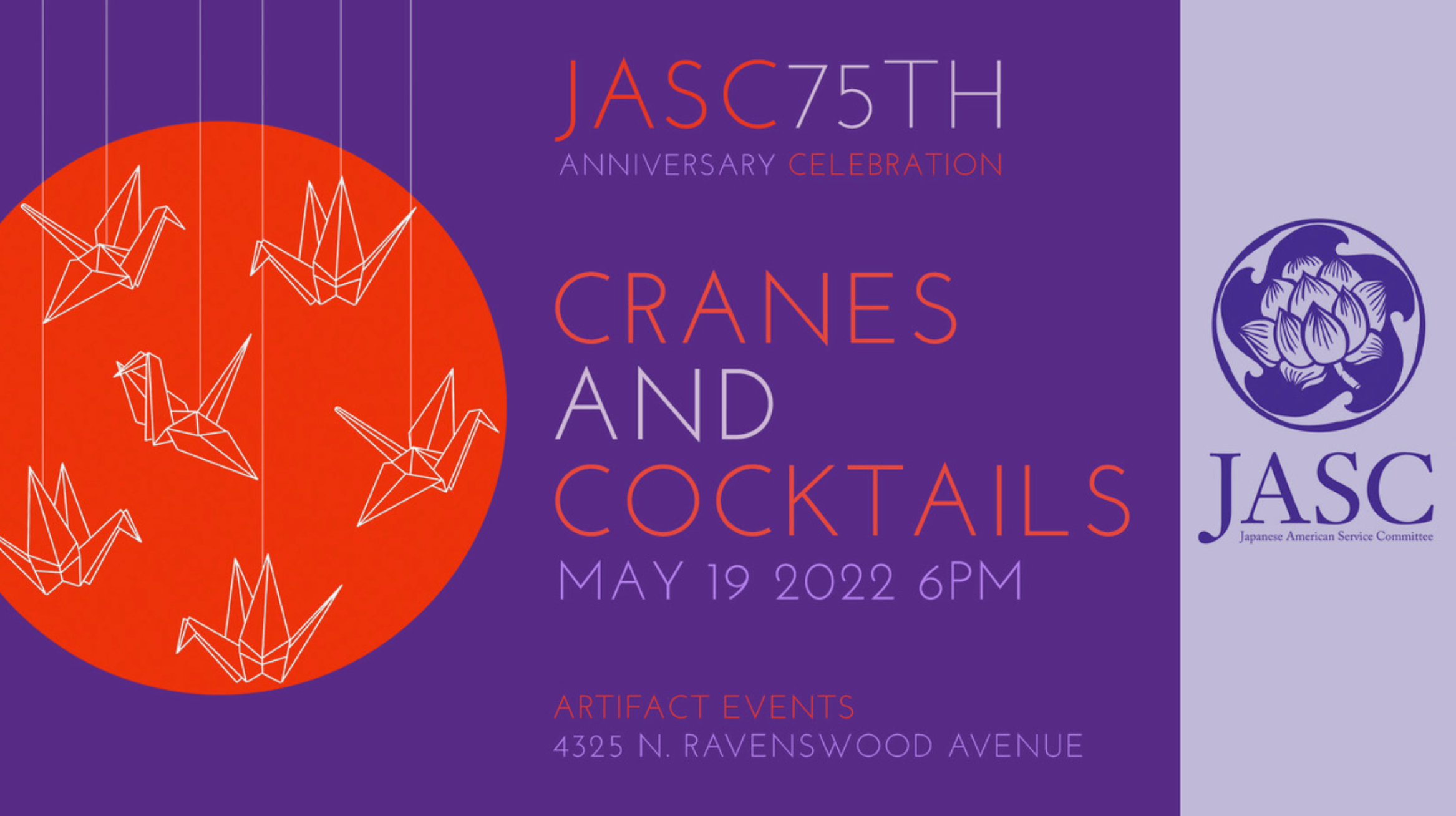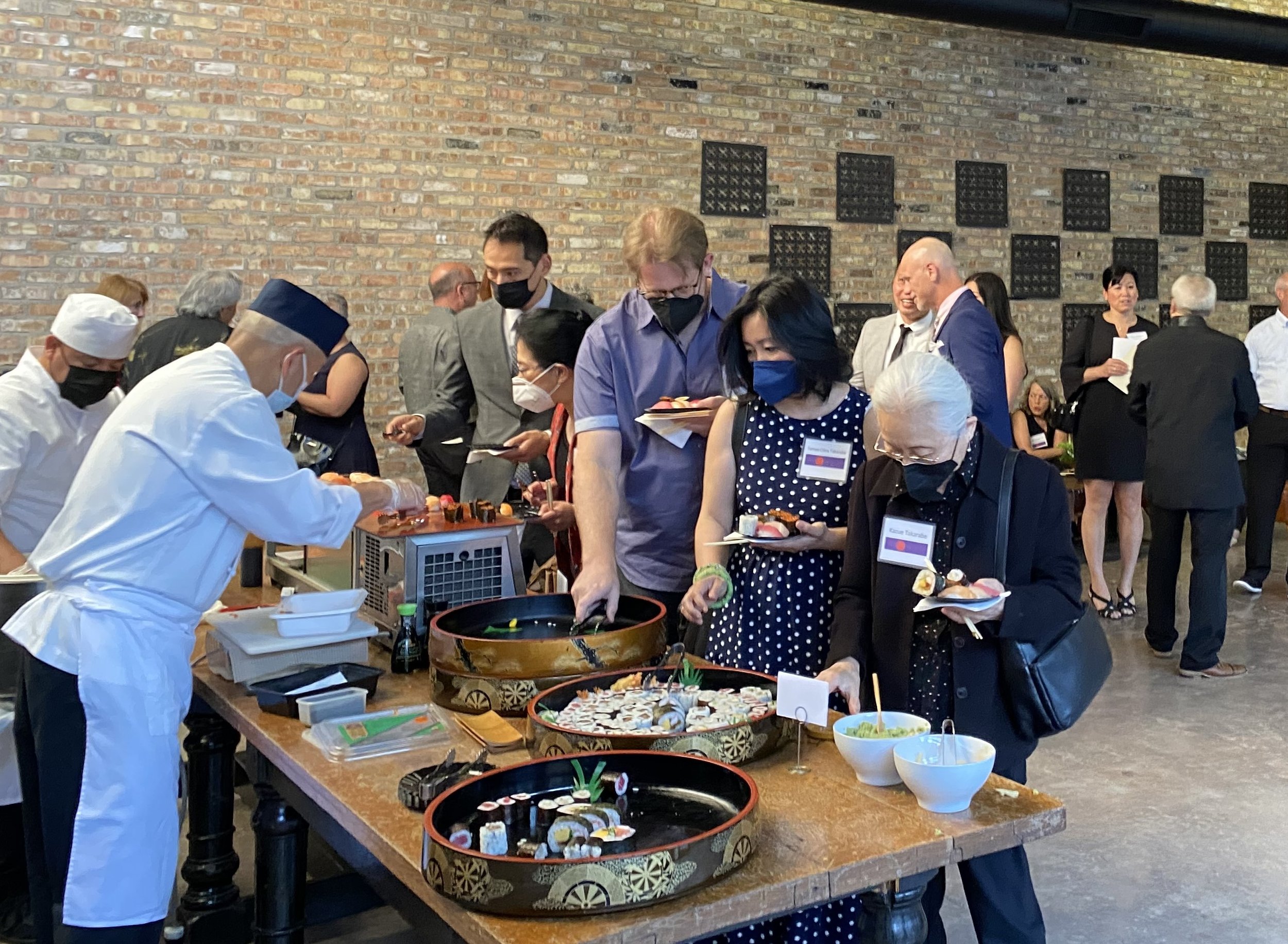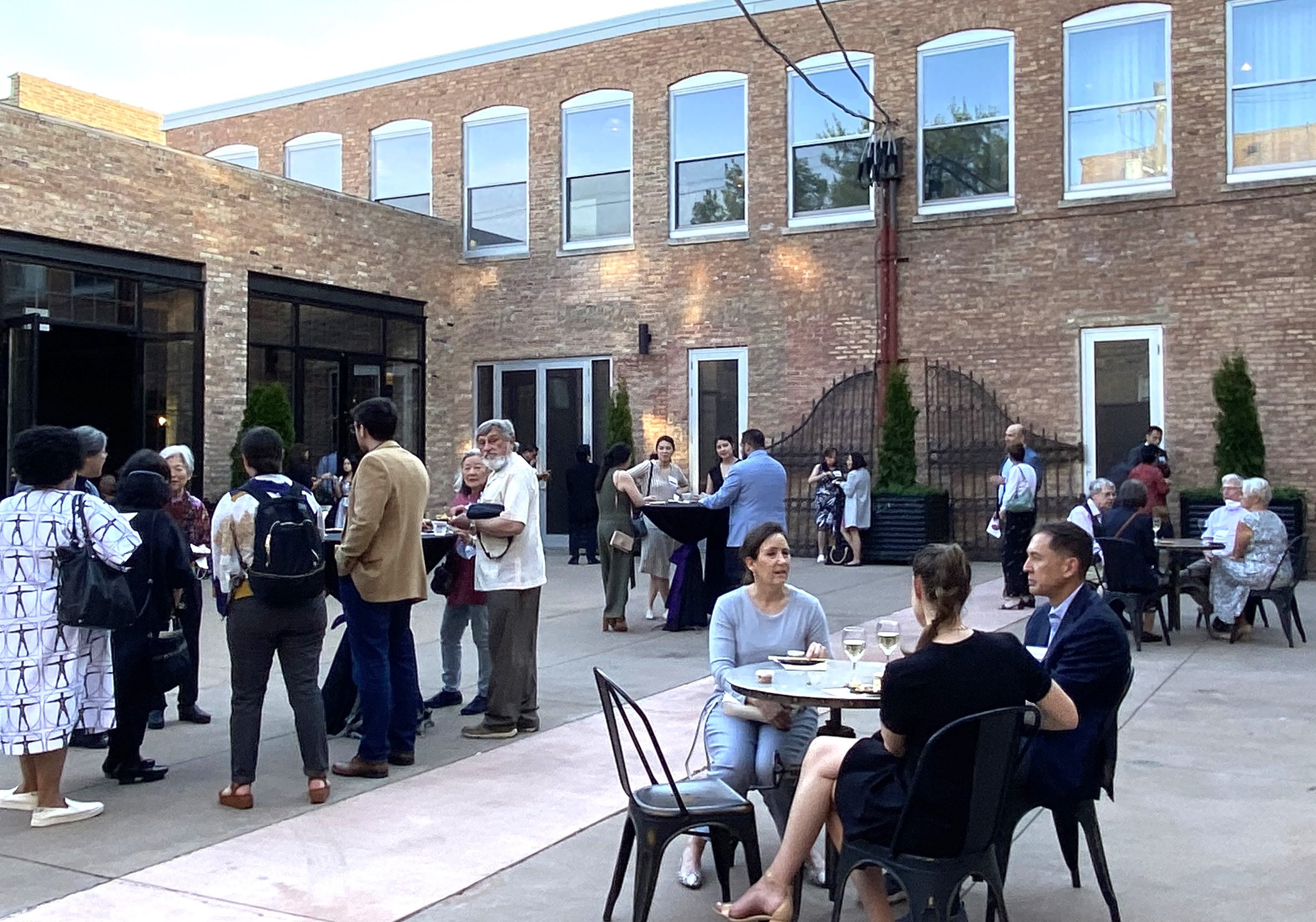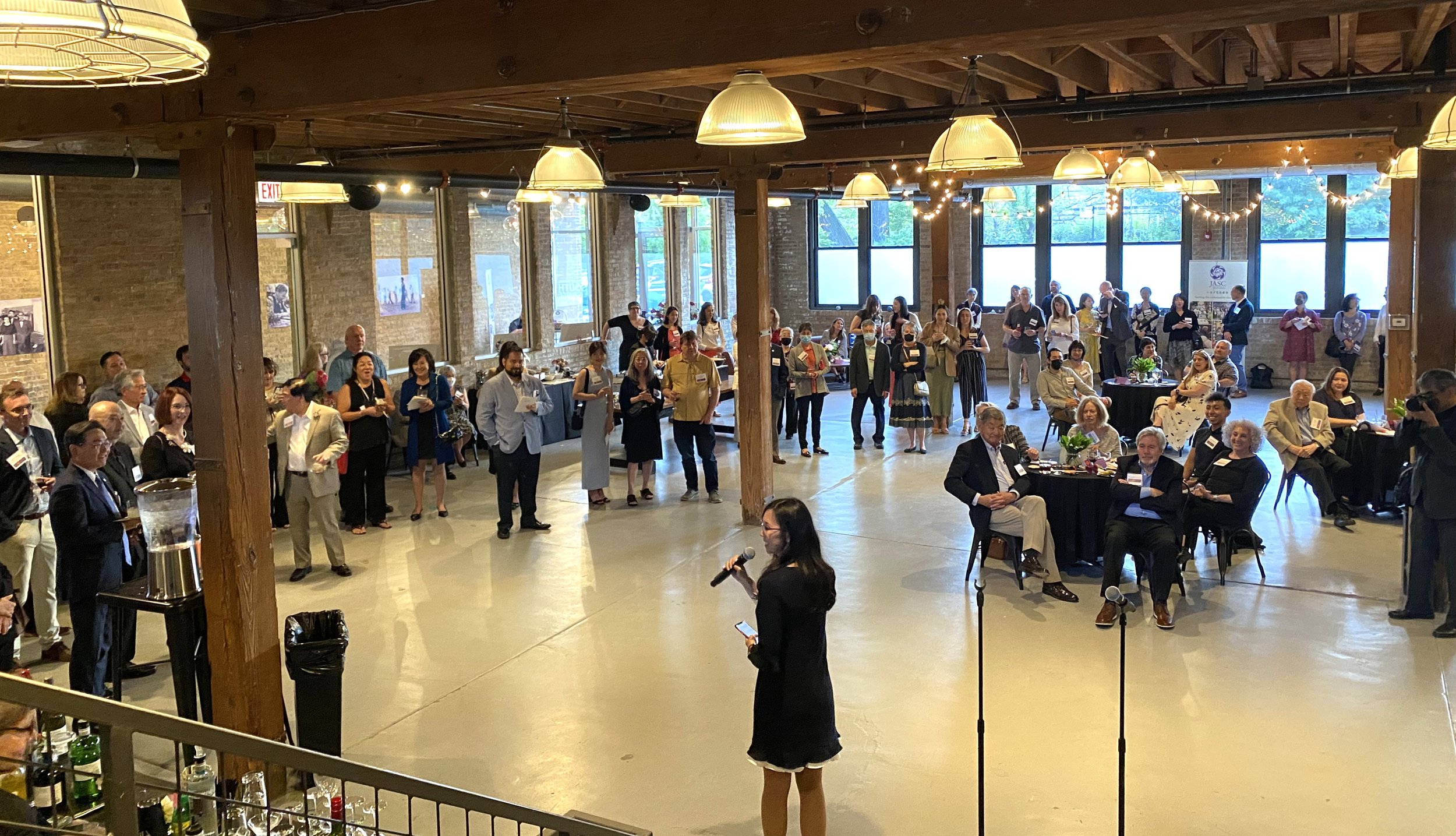JASC Celebrates 75 years of Serving Chicago’s Japanese American Community
Multiple generations of Chicago’s Japanese Americans and their friends gathered at Artifact Events in Chicago’s North Side on May 19 to celebrate of the 75th anniversary of the Japanese American Service Committee (“JASC”). The guests of the two-hour event, including Consul General in Chicago Hiroshi Tajima and Tetsuro Mitani, Executive Director of the Japanese Chamber of Commerce and Industry of Chicago, toasted the organization’s “amazing history” of serving the Japanese American community.
Photo: JASC President Stacy Uchida Brown speaking before the guests, including Consul General Tajima | Yoshiko Urayama
Organized in 1946, JASC aims to engage people of all ages to “experience Japanese American History and culture and to improve their well-being through innovative, high-quality programs and services tailored to the multicultural community” (JASC website). In order to achieve these goals, the organization maintains the Legacy Center Archives and Library (a community-based resource center that collects and preserves materials from the Japanese American community in Chicago), offers cultural classes that teach Japanese culture including the language, cooking and flower arrangement, and sponsors programs and events such as scholarships and special celebrations.
All funds raised for the event from ticket sales, sponsorships and activities at the reception will support the organization in its community activities, according to its website statement. The main activity of the day was a fundraising. Led by JASC’s CEO Michael Takada, the successful bidding from the enthusiastic guests surpassed its goal of $75,000.
JASC’s role as a community center of educational resources was emphasized by JASC President Stacy Uchida Brown. The JASC Legacy Center was a case in point. After having endured the hardship at an internment camp, Brown’s family resettled in Chicago. They focused on blending into the local community as American citizens and rebuilding their lives. For many years, they didn’t talk about their internment experience. Brown didn’t know what happened to her parents and grandparents during the war until she was in her 20s.
With its rich records and archives, the JASC Legacy Center can connect younger generations of Japanese Americans with their family history, Brown said. “I want you to explore and learn about your family history through the resources at the Legacy Center,” she added.
History of JASC
The January 3, 1946 issue of The Chicago Shimpo reports that the Chicago Resettlers Committee (the predecessor of JASC) will host an open house event on January 6 at its temporary office located at 1110 N. LaSalle. Representatives of Chicago’s white communities and Japanese American organizations had been invited to the event, where refreshments and entertainment – movie screening and musical performances – were planned. The article also says that the Committee, with its aim to provide healthy entertainment to the first- and second-generation Japanese Americans, planned to host a go tournament and English classes.
The following week’s Chicago Shimpo (January 10 issue) reported a city-wide go tournament would be held by the Committee at the Chicago Buddhist Temple on January 12 and 13.
According to the Shimpo’s January 17, 1946 issue, the Chicago Resettlers Committee, which officially commenced its activities with the open house event on the 6th, has unveiled its prospectus. It can be read in that article in its entirety. The gist includes the following:
There are about 20,000 Japanese American resettlers in Chicago who are trying to rebuild their lives. They include the elderly, small children, young people without parents and others who would need help. A lot of people also need help to find a job, the most pressing issue for successful resettlement. In addition, the first generation resettlers, who have been working so diligently throughout their lives, need help and comfort in the form of socialization and entertainment.
We all agree that at this period of transition, we need an organization that would provide appropriate solutions to all the issues and problems that face the resettlers, show the right path for Japanese Americans to follow, promote the rebuilding of their lives, and work toward future happiness and prosperity based on unyielding principles.
The Chicago Resettlers Committee was formed out of the needs of the time and is determined to serve as a volunteer organization to achieve the goals stated above, while effectively collaborating with other existing organizations.
According to Chicago Nikkei Hyakunen-shi (“100-year History of Chicago Japanese Americans”), the original members of the Committee included: Harry Mayekawa (President); Tahei Matsunaga (Vice President); Setsuko Nishi (Secretary); Kohachiro Sugimoto (Accounting); Yasunori Maruyama (Auditor); Tokuyoshi Kawasaki (Executive Director); and Thomas Shinao Masuda, William Hiura, Ryoichi Fujii, Koichi Masunaka, Gyomei Kubose, Yoshimatsu Oyama, Jitsuo Morikawa, Matsusaburo Kuki, Sakaye Toda, Ichikuro Kondo, Matsutaro Takemori, Brenton Lauter (Possibly Rother) and Walsh Water (Directors).
The Resettlers Committee began as an agency to provide former internees in the Chicago area with information regarding legal, healthcare, real estates and banking issues while helping them find a job and housing and organizing entertainment and special events.
As they gradually resettled in the community, the Committee reassessed its original mission and began focusing on serving the aging first generation Japanese Americans in the community. Programs were developed and implemented for that purpose, including the building of a nursing home and a special housing for the elderly, as well as adult day care and meal services.
As the third and fourth generations took over the running of the Committee, its area of service broadened to cover the north side of Chicago. To reflect the shift in its focus, the organization’s name was changed to the Japanese American Service Committee.
JASC today continues to offer a wide variety of services to Japanese Americans beyond Uptown for their mental and physical welfare.
JASC’s most recent focus is the expansion of its cultural and community programs to preserve the legacy of Japanese Americans and keep it relevant to today’s changing cultural environment. In order to achieve this goal, the Committee provides individuals in its Artists-in-Residence programs with a “platform to showcase their skills, talent and knowledge.”
JASC’s Legacy Center holds an archival collection of national importance, which “paints a powerful and complex portrait of the Japanese American community in Chicago” (JASC website). The collection includes books, personal journals, oral histories, artifacts, photographs and films. The Legacy Center is open to the public (an appointment is required before visiting).
For a detailed history of JASC, visit their website.





